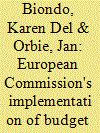| Srl | Item |
| 1 |
ID:
131373


|
|
|
|
|
| Publication |
2014.
|
| Summary/Abstract |
The complex relationship between democracy and development has been extensively discussed in academic literature. However, we do not have much knowledge of how this translates into donor practices. How does the European Commission (EC) deal with tensions arising from promoting democracy and development? To answer this question, this article operationalises the distinction between 'democracy promoters' and 'developmental donors', focusing specifically on budget support and governance incentive tranches. Empirically we examine the implementation of the EC's budget support and Governance Incentive Tranche in Ethiopia (2005-10), a case where the dilemma between democracy promotion and development cooperation is particularly strong. Investigating the position of the EC along the democracy promoter versus developmental donor continuum, we conclude that the EC's position lies between these extremes. However, in the case of budget support, a shift has been made away from the Commission being a democracy promoter and towards the role of developmental donor.
|
|
|
|
|
|
|
|
|
|
|
|
|
|
|
|
| 2 |
ID:
137089


|
|
|
|
|
| Summary/Abstract |
This article analyses the substance of the European Union's and United States' democracy assistance in Ethiopia in 2005–2010. Does this case reveal a transatlantic split, whereby the EU focuses on the external context and the US on the partial regimes of embedded, liberal democracy? Emphasizing the importance of institutions in analysing how interests and ideas affect democracy assistance, the article investigates how the substance may differ between the European Development Fund (EDF), European Instrument for Democracy and Human Rights (EIDHR), US Agency for International Development (USAID) and the National Endowment for Democracy (NED). The analysis finds a transatlantic split whereby the EU focused more on the external context and the US more on the partial regimes. This transatlantic split can be explained by the combination of ideas and institutions. More specifically, it reflects a difference between the EDF and USAID in their focus on ownership, alignment and harmonization in democracy assistance. The combination of interests and institutions played a less significant role in explaining the substance of democracy assistance, as USAID emphasized the partial regimes, despite political control from the State Department.
|
|
|
|
|
|
|
|
|
|
|
|
|
|
|
|